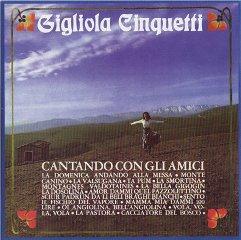Gigliola Cinquetti – Cantando con gli amici (1971)
Gigliola Cinquetti – Cantando con gli amici (1971)

1. La domenica andando alla Messa 2. Monte Canino 3. La Valsugana 4. Ta pum 5. La smortina 6. La dosolina 7. Montagnes valdotaines 8. La bella Gigogin 9. Amor dammi quel fazzolettino 10. Sciur padrun da li beli braghi bianchi 11. Sento il fischio del vapore 12. Mamma mia dammi cento lire 13. Oi Angiolina, bell'Angiolina 14. Vola, vola, vola 15. La pastora 16. Il cacciatore nel bosco Renato Angiolini – aranger, conductor
Gigliola Cinquetti, the Italian winner of the 1964 Eurovision Song Contest, was born on December 20, 1947, in Verona. She first received attention at age 16, when she triumphed at the annual San Remo Song Contest in early 1964; just weeks later, she swept to victory at Eurovision, to set herself up for a stunningly successful career. Her winning entry at both events, incidentally, was "Non Ho L'Eta" (Not Old Enough). The song was a major hit throughout Europe, including the traditionally resistant U.K. "Dio, Some Ti Amo" brought Cinquetti further international success in 1966; among her other hits are "Piccola Cittá" (1967), "La Pioggia" (1969), "Amarti e Poi Morire," "Le Bateau Mouche" (1971), and "Je Suis Timide" (1972). Through this same period, her albums included Alle Porte del Sole, Auf der Straße der Sonne, Cantando con Gli Amici, Giovane Vecchio Cuore, Il Treno Dell'amore, Pensieri di Donna, and Stasera Ballo Liscio.
After a decade spent topping the Italian charts, Cinquetti returned to Eurovision in 1974, this time performing "Si" — and running into a political firestorm in her homeland. Italy was about to go to the polls for a referendum on the legalization of divorce. It was feared that the song's title, translating as "Yes," would be construed as a commentary upon the debate and might even act as a subliminal message to voters. Italy's national broadcasters RAI not only banned the song from the airwaves, but even censored it from their telecast of the Eurovision Song Contest itself. Still, "Si" finished second (behind ABBA's "Waterloo"), while an English-language version, "Go," gave Cinquetti her second U.K. hit. Since that time, Cinquetti has remained a force to be reckoned with in her homeland and beyond, and she returned once more to Eurovision in 1991 to co-host the event with the previous year's winner, Italian Toto Cutugno --- itunes.apple.com
download (mp3 @320 kbs):
yandex 4shared mega mediafire cloudmailru uplea ge.tt








